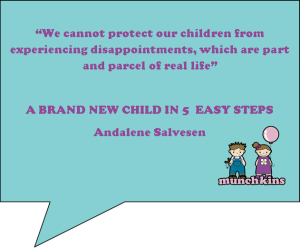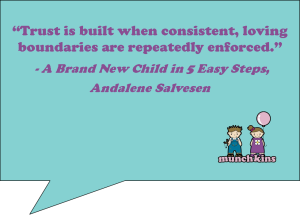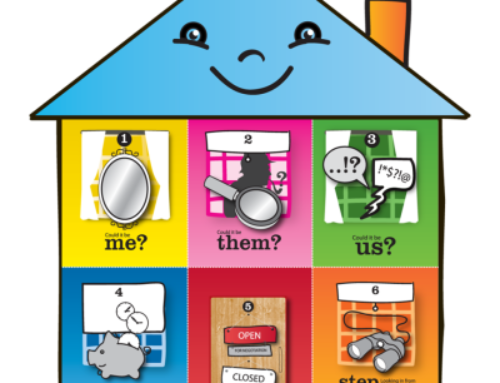
I recently had the privilege of attending two of Andalene’s talks in one week. I still find myself marveling at her wisdom and the practical, no nonsense way of imparting it. And I found myself thinking, this lady has definitely been set apart for a time such as this.
In a world where everything that used to be the norm has become exceptions to the rule, parents need guidance more than ever. In her book, “A brand new child in 5 easy steps”, Andalene addresses the steps that we as parents need to follow in order to break these worldly patterns.
Below is a short summary of these steps, but I would really recommend that you read the entire book for a holistic approach, also taking into consideration that children each have their own unique temperaments that need to be taken into consideration.
1. It’s all about attitude
The first step Andalene addresses is the attitude in which we approach our roles as authority figures in our children’s lives.
The truth of the matter is that everything starts with attitude. If you are serious about “getting this parenting thing right”, I would seriously like to suggest that you take some time for self reflection. Perhaps you need some insight into your own attitude as a parent and work at breaking the destructive patterns from your own childhood. Deciding to work on our own issues before trying to impart something of that to our own children will save a lot of hassle when tackling this process.
It’s not what you say
Children are not born with a sense of right and wrong. They will therefore continuously push and test boundaries. Without our loving guidance, these boundaries will know no bounds.
How you convey something to your child is therefore vitally important. Are you giving them an option or an instruction? You need to say what you mean and mean what you say. Giving them an option, when you really meant it as an instruction is not only confusing, but it also leaves the door open for your child to not act on either of the options.
For example: Would you like to play in your room or outside?” is an option and could turn into “No, I want to go play at Billy’s house.” versus “go play in your room”, which is an instruction and not negotiable.
Existing house rules are like standing instructions. If couch jumping is a no-no in your house, there should consistently be a predictable consequence that had been discussed with them on a previous occasion when you set the rule. If you are not going to be willing to take action, then rather do not make that a rule; instead turn around and walk away.
Read more about the words we use here.
Just do it!
The ultimate purpose of it all is to build our children up, so also remember never to address your child as “naughty”, but to rather address the behaviour (e.g. “biting your sister is not nice and it is not acceptable”). Your child needs to understand he is always loved unconditionally, but his actions or attitude is not acceptable and will not be tolerated.
Once you’ve decided on standing rules, you need to be consistent in carrying out those consequences. Children are smart and they will quickly learn when your “no” doesn’t really mean “no” and then proceed to use the fine art of manipulation to sway your initial no to a yes. Ultimately, it’s about your resolve as a parent. Changing the rules from one day to the next will only result in confusing your child and teaching them the entirely wrong message about the true meaning of authority.
Consider these scenarios:
• “I said no, and do not ask again” – and they ask again (nagging)
• “Do not get off your chair” – but they get off
• “Pack away your toys” – and they ignore you
• “Do not get out of your bed” – and they get into your bed
So, ultimately it comes down to listening. When “you didn’t listen” there will be a consequence. Effective use of time-outs and/or natural consequences forms the basis of success at this point. The consequence needs to be uncomfortable enough to send a message to the brain that says, “In future, avoid this at all costs”.
You can read more about effective time-outs here.
Empathise

“I know you are disappointed, but next time I am sure you will make better choices.”
When you consistently stick to your negotiated boundaries, your child’s initial anger will eventually turn into sadness and disappointment for not getting his way.
Disappointment deserves understanding and empathy. Try to connect with his feelings by putting a word to the appropriate emotion, such as: “I am sure you must be so disappointed”, or “I know you are sad”. When a child feels understood, he can move forward and focus on the issue at hand, which is obedience. He will soon realise that you care about your feelings, but that you will not compromise on your resolve to discipline.
Andalene often likes to say “You can’t prepare the road for your children, but you can prepare your children for the road.” Disappointments are part and parcel of real life. Our job is to give them the tools from early on to learn how to cope with these disappointments.
Consistency
Trust is built when consistent, loving boundaries are repeatedly enforced. When they consistently see that your “yes” is your “yes” and your “no” means “no”, they will know exactly where they stand, feel safe, and build confidence and trust in your relationship and in themselves.
One of Andalene’s favourite responses to her children’s attempts at nagging was “Has my no ever changed?”
Therefore, before you reply with a “no”, think very carefully and be sure that you definitely mean it so that you will not be tempted to change your decision under the pressure of skillful childhood manipulation.
But how?!
While listening to Andalene, there are a lot of “aha” moments, but as soon as you get home, you may find yourself wondering: “But how on earth do I do this practically?”
And this is where the value of a home visit comes in! Either Andalene, or one of the trained Munchkins coaches will come into your home for 3 hours and show you (and your partner) how to enforce effective time-outs.
Only once the listening aspect (obedience) is established, can you move on to other issues like sleeping and eating.
It is truly an investment in your child’s future and will result in your home becoming a peaceful environment for all!
For more information, to make a booking, or to order Andalene’s books: “A Brand-New Child in 5 Easy Steps” or “Raising Happy, Healthy Children”, please contact:
Jenni Noel (SA)
jenni@munchkins.me | 074 807 8580
Pernille Muller Holberg (Dubai)
(Dubai Client Relations and Bookings)
pernille@supergramme.me | +971 55 343 5937
Anneli James (USA)
(USA Client Relations and Bookings)
annelie@munchkins.me | +1 508 385 6639







